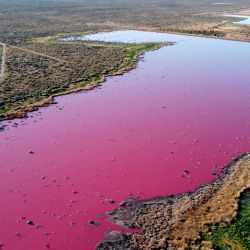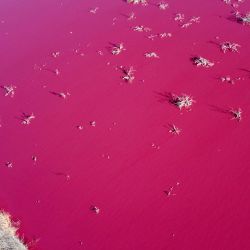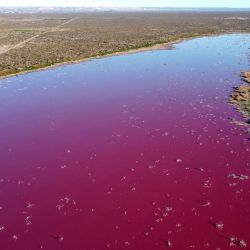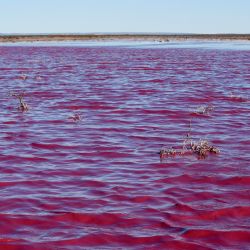The pollution of a Patagonian lake with a pink industrial fluid has provoked alarm among local residents as well as controversy among officials.
The origin of the conflict was the permission granted to fisheries companies to dump waste in the Laguna de Corfo, 30 kilometres away from the Chubut town of Trelew.
"The colouring is due to the preservative, sodium sulphide, an anti-bacterial agent which also contaminates the water table of the Chubut River and the water supply of cities in the region. The law orders the treatment of such liquids before being dumped," Federico Restrepo, a Colombian engineer, environmentalist and virologist and a local resident, told AFP.
Residents have long complained of foul smells and other environmental issues around the river and lagoon.
"Those who should be in control are the ones who authorise the poisoning of people," environmental activist Pablo Lada told AFP, blaming the government for the mess.
The lake, 10 to 15 hectares in area, is situated in the Industrial Park of Trelew, which was founded by Welsh settlers over 150 years ago. Fisheries are important for the 600,000 inhabitants of Chubut, along with agriculture, the food industry and tourism (based on the whales near Puerto Madryn and the penguins of Punta Tombo).
Residents in the area are fed up. In recent weeks, locals of Rawson, neighboring Trelew, blocked roads used by trucks carrying processed fish waste through their streets to treatment plants on the city's outskirts.
"We get dozens of trucks daily, the residents are getting tired of it," said Lada.
With Rawson off limits due to the protest, provincial authorities granted authorisation for factories to dump their waste instead in the Corfo lagoon.
An agreement was made with a company [transporting effluent from the fisheries] to dump liquids into the Laguna de Corfo. The pink colour does no harm and disappears in a few days," said Juan Micheloud, in charge of environmental control for the province.
But Trelew Planning Secretary Sebastián de la Vallina disagreed: "No way he can go minimising something so serious."
Plants that process fish for export, mainly prawns and hake, generate thousands of jobs for Chubut Province, home to some 600,000 people.
Dozens of foreign fishing companies operate in the area in waters under Argentina's Atlantic jurisdiction.
"Fish processing generates work... it's true. But these are multi-million-dollar profit companies that don't want to pay freight to take the waste to a treatment plant that already exists in Puerto Madryn, 35 miles away, or build a plant closer," said Lada.
– TIMES/AFP



























Comments